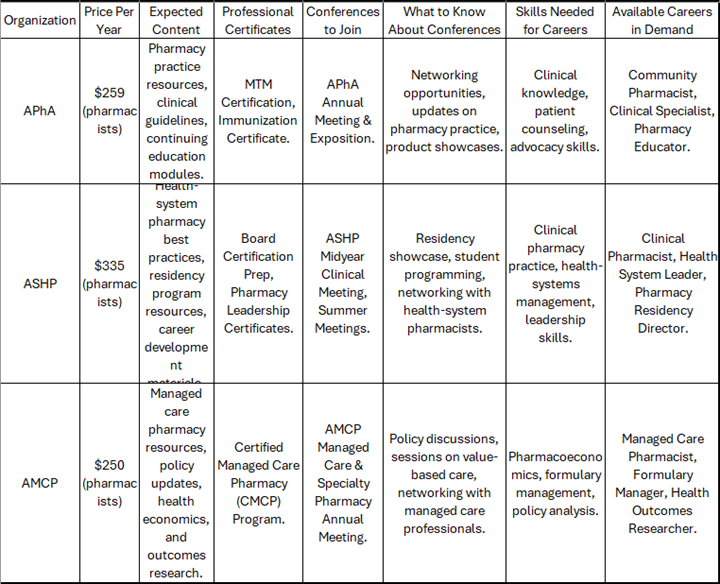The pharmacy profession is at a pivotal juncture. With rapid advancements in healthcare technology, evolving patient needs, and shifting regulatory landscapes, pharmacists are transitioning from traditional roles to becoming integral members of interdisciplinary healthcare teams. This transformation necessitates a strategic approach to career planning, ensuring pharmacists not only stay relevant but also excel in a competitive field.
I. Self-Assessment
Strengths and Interests
Embarking on a successful career journey begins with introspection. Identify your core strengths and interests:
- Clinical Expertise: Are you passionate about patient care and direct clinical interventions?
- Research and Development: Do you have a keen interest in pharmaceutical research or drug development?
- Technology Integration: Are you intrigued by healthcare informatics and the integration of technology in pharmacy?
Utilize tools like SWOT analysis (Strengths, Weaknesses, Opportunities, Threats) to map out your professional landscape.
Market Trends
Understanding current and future market demands is crucial. Key trends include:
- Growth in Specialty Pharmacy: An increase in complex therapies requiring specialized handling.
- Telepharmacy Expansion: Remote medication counseling and verification services.
- Pharmacogenomics: Personalized medicine based on genetic profiles.
II. Setting SMART Goals
Specific and Measurable
Vague goals yield vague results. Define clear objectives:
- Example: “Obtain Board Certification in Oncology Pharmacy (BCOP) within the next 18 months.”
Achievable and Relevant
Align your goals with industry needs and personal capabilities:
- Achievable: Ensure you have the resources and time to pursue the goal.
- Relevant: The goal should advance your career and meet market demands.
Time-Bound
Set deadlines to maintain momentum:
- Short-Term Goals: Achieve within 1-2 years.
- Long-Term Goals: Aim for 5-10 years down the line.
III. Professional Development
Continuing Education
Stay ahead by enhancing your qualifications:
- Advanced Degrees: Pursue a PharmD, Master’s, or Ph.D. in specialized fields.
- Certifications: Consider certifications like Certified Diabetes Educator (CDE) or Certified Specialty Pharmacist (CSP).
Skill Enhancement
Develop soft skills alongside technical expertise:
- Leadership Training: Attend workshops or courses on management.
- Communication Skills: Enhance patient counseling and interprofessional collaboration abilities.
- Technological Proficiency: Learn about EHRs, pharmacy automation systems, and data analytics.
IV. Networking Strategies
Building Relationships
Cultivate a robust professional network:
- Mentorship: Seek guidance from experienced professionals.
- Peer Connections: Collaborate with colleagues for shared learning and support.
Professional Organizations
Membership can offer numerous benefits:
- American Pharmacists Association (APhA): Access to resources, conferences, and continuing education.
- American Society of Health-System Pharmacists (ASHP): Networking opportunities and residency program information.
- Academy of Managed Care Pharmacy (AMCP): Focuses on the advancement of managed care pharmacy practice. Provides access to health policy updates, networking opportunities, and professional development resources in the field of managed care.

V. Adapting to Change
Flexibility
Be prepared to pivot as the industry evolves:
- Embrace New Roles: Explore opportunities in areas like pharmacogenomics, regulatory affairs, or health informatics.
- Continuous Learning: Stay updated with the latest industry advancements and adapt your skill set accordingly.
Resilience
Overcoming obstacles is part of the journey:
- Setbacks as Learning Opportunities: Analyze challenges to improve and grow.
- Maintain a Positive Mindset: Resilience fosters persistence and long-term success.
Conclusion
Proactive Approach
Taking charge of your career through strategic planning is imperative. By:
- Self-Assessing: Knowing your strengths and market opportunities.
- Setting SMART Goals: Creating a roadmap with clear milestones.
- Investing in Development: Continuously enhancing your skills.
- Networking: Building a supportive professional community.
- Adapting: Staying flexible and resilient in the face of change.
You position yourself not just to survive but to thrive in the future of pharmacy.
Long-Term Success
Your proactive efforts today lay the foundation for a fulfilling and successful career tomorrow. Embrace the journey with enthusiasm and a commitment to excellence.







